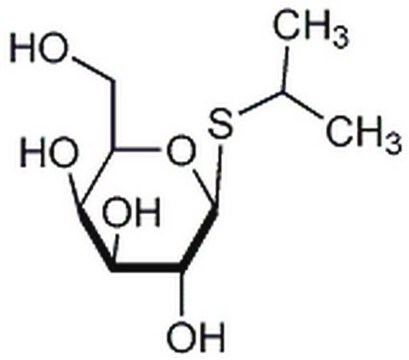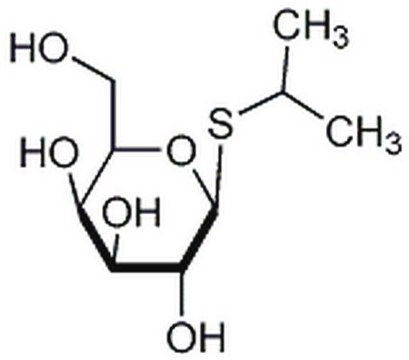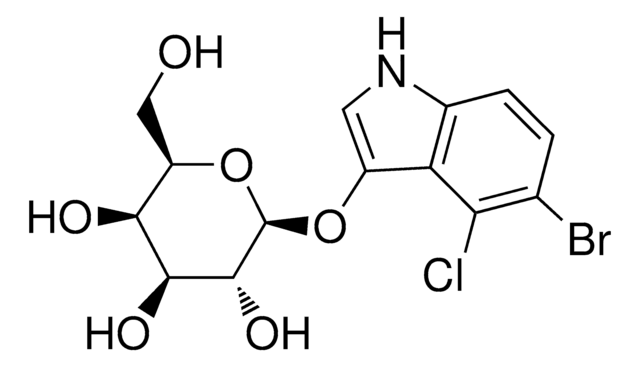I1284
Isopropyl β-D-thiogalactopyranoside solution
ReadyMade IPTG solution for Blue-white screening
Synonym(s):
IPTG solution
Sign Into View Organizational & Contract Pricing
All Photos(3)
About This Item
Empirical Formula (Hill Notation):
C9H18O5S
CAS Number:
Molecular Weight:
238.30
Beilstein:
4631
MDL number:
UNSPSC Code:
12352200
PubChem Substance ID:
NACRES:
NA.52
Recommended Products
grade
for molecular biology
Quality Level
description
non-ionic
form
liquid
mol wt
238.3
shipped in
dry ice
storage temp.
−20°C
SMILES string
CC(C)S[C@@H]1O[C@H](CO)[C@H](O)[C@H](O)[C@H]1O
InChI
1S/C9H18O5S/c1-4(2)15-9-8(13)7(12)6(11)5(3-10)14-9/h4-13H,3H2,1-2H3/t5-,6+,7+,8-,9+/m1/s1
InChI key
BPHPUYQFMNQIOC-NXRLNHOXSA-N
General description
Isopropyl thiogalactose (IPTG) is a sugar derivative widely used for the induction of the expression of recombinant proteins in E. coli. This expression system requires that the gene of interest is cloned in plasmids containing the Lac promoter. IPTG Ready Made is a 0.2 μm filter sterilized solution of 200 mM IPTG. This reagent remains liquid at its storage temperature (-20 °C), thus avoiding freeze-thaw cycles and providing a user-friendly solution.
Application
Isopropyl β-D-thiogalactopyranoside solution is:
- used as an inducer for the expression of single domain antibodies(sdAbs) in E coli and bioactive peptides
- used in its half-life and decay studies
- suitable for induction of recombinant protein expression in systems controlled by the lac repressor
Biochem/physiol Actions
Isopropyl β-D-thiogalactopyranoside binds to the lac repressor and releases the tetrameric repressor from the lac operator in an allosteric manner. This binding allows the transcription of genes in the lac operon, such as the gene coding for β--galactosidase. The β-galactosidase gene is transcribed and monosaccharides are the product. Since Isopropyl β-D-thiogalactopyranoside cannot be metabolized by E. coli its concentration remains constant. Therefore, it is not a variable in the experiment.
Principle
Isopropyl β-D-thiogalactopyranoside binds to the lac repressor and releases the tetrameric repressor from the lac operator in an allosteric manner. This binding allows the transcription of genes in the lac operon, such as the gene coding for β-galactosidase. The β-galactosidase gene is transcribed and monosaccharides are the product.
related product
Product No.
Description
Pricing
Storage Class Code
10 - Combustible liquids
WGK
WGK 2
Flash Point(F)
Not applicable
Flash Point(C)
Not applicable
Personal Protective Equipment
dust mask type N95 (US), Eyeshields, Gloves
Certificates of Analysis (COA)
Search for Certificates of Analysis (COA) by entering the products Lot/Batch Number. Lot and Batch Numbers can be found on a product’s label following the words ‘Lot’ or ‘Batch’.
Already Own This Product?
Find documentation for the products that you have recently purchased in the Document Library.
Customers Also Viewed
Engineering of ultra-small diagnostic nanoprobes through oriented conjugation of single-domain antibodies and quantum dots
Sukhanova A, et al.
Protocol Exchange, 10 (2012)
Half-life measurements of chemical inducers for recombinant gene expression
Pasotti L, et al.
Journal of Biological Engineering, 8(1), 5-5 (2014)
Random sequences are an abundant source of bioactive RNAs or peptides
Neme R, et al.
Nature ecology & evolution, 1(6), 0127-0127 (2017)
L H Hansen et al.
Current microbiology, 36(6), 341-347 (1998-06-03)
The role of the Escherichia coli lacY gene product (the lactose permease) in the induction of isopropyl-beta-D-thiogalactopyranoside (IPTG) inducible promoters was studied in E. coli and P. fluorescens. This was done by comparing strains containing a lacIPOZYA chromosomal insert with
Iltaf Ahmed et al.
Human molecular genetics, 24(11), 3172-3180 (2015-02-24)
There are two known mRNA degradation pathways, 3' to 5' and 5' to 3'. We identified likely pathogenic variants in two genes involved in these two pathways in individuals with intellectual disability. In a large family with multiple branches, we
Our team of scientists has experience in all areas of research including Life Science, Material Science, Chemical Synthesis, Chromatography, Analytical and many others.
Contact Technical Service



